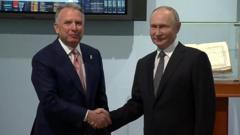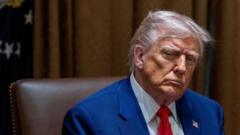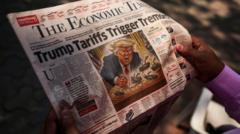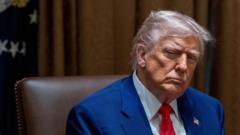As Trump's administration grapples with economic discontent and political challenges, his ambitious agenda faces hurdles that may alter his path forward.
Trump's Tariff Plan Faces Economic and Political Backlash Amid Struggling Agenda
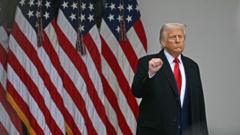
Trump's Tariff Plan Faces Economic and Political Backlash Amid Struggling Agenda
The former president's bold trade initiatives collide with market realities and mounting dissent.
Trump's recent announcement of sweeping tariffs on US imports marked a significant moment in his second-term agenda, which he referred to as America’s “liberation day.” However, just two days after unveiling these tariffs, the stock market experienced a significant downturn, raising concerns about the tangible impact of his policies, especially as trading partners like Canada, the EU, and China began to push back against his measures.
The atmosphere in the White House has become increasingly tense, with reports of a potential large-scale anti-Trump demonstration set to take place near the Washington Monument. In reaction to perceived threats to security, a scheduled garden tour at the White House was abruptly postponed. President Trump remained optimistic in addressing reporters before his flight to Florida, asserting that both the economy and the U.S. would rebound despite the current turmoil.
However, this week's challenges extended beyond trade. Trump's dual foreign policy priorities—resolving conflicts in Gaza and Ukraine—have also encountered severe complications. The situation in Gaza has escalated sharply, straying from the ceasefire he had previously touted, as Israel intensified its military campaign. In Ukraine, Russia has introduced new demands that seem designed to prolong negotiations rather than seek a genuine resolution.
Moreover, immigration enforcement—long considered a cornerstone of Trump’s platform—has faced legal challenges that threaten to undermine its effectiveness. Recent deportation flights have been interrupted by judicial scrutiny, with significant legal challenges awaiting resolution concerning Trump's immigration initiatives.
In a significant electoral event this past week, voters in Wisconsin and Florida went to the polls, with results indicating a potential shift in political momentum. Democrats achieved a crucial victory in Wisconsin's state judge election while Republican candidates in Florida experienced reduced winning margins. This swing in electoral results signals a growing challenge for Trump's leadership within his own party, with conservative figures like Ted Cruz voicing concerns over the potential adverse effects of the tariffs on American jobs.
Despite maintaining party loyalty, cracks within Republican support are beginning to appear, especially among senators advocating for a check on Trump’s tariff authority. If the economic repercussions of his policies become entrenched and unpopular, dissent could increase among Republican ranks, potentially signaling a transformative moment in Trump's political career.
As the former president navigates these turbulent waters, it seems that while he currently enjoys a considerable amount of freedom from voter scrutiny, the overarching realities of trade and political viability are looming larger than ever before.
The atmosphere in the White House has become increasingly tense, with reports of a potential large-scale anti-Trump demonstration set to take place near the Washington Monument. In reaction to perceived threats to security, a scheduled garden tour at the White House was abruptly postponed. President Trump remained optimistic in addressing reporters before his flight to Florida, asserting that both the economy and the U.S. would rebound despite the current turmoil.
However, this week's challenges extended beyond trade. Trump's dual foreign policy priorities—resolving conflicts in Gaza and Ukraine—have also encountered severe complications. The situation in Gaza has escalated sharply, straying from the ceasefire he had previously touted, as Israel intensified its military campaign. In Ukraine, Russia has introduced new demands that seem designed to prolong negotiations rather than seek a genuine resolution.
Moreover, immigration enforcement—long considered a cornerstone of Trump’s platform—has faced legal challenges that threaten to undermine its effectiveness. Recent deportation flights have been interrupted by judicial scrutiny, with significant legal challenges awaiting resolution concerning Trump's immigration initiatives.
In a significant electoral event this past week, voters in Wisconsin and Florida went to the polls, with results indicating a potential shift in political momentum. Democrats achieved a crucial victory in Wisconsin's state judge election while Republican candidates in Florida experienced reduced winning margins. This swing in electoral results signals a growing challenge for Trump's leadership within his own party, with conservative figures like Ted Cruz voicing concerns over the potential adverse effects of the tariffs on American jobs.
Despite maintaining party loyalty, cracks within Republican support are beginning to appear, especially among senators advocating for a check on Trump’s tariff authority. If the economic repercussions of his policies become entrenched and unpopular, dissent could increase among Republican ranks, potentially signaling a transformative moment in Trump's political career.
As the former president navigates these turbulent waters, it seems that while he currently enjoys a considerable amount of freedom from voter scrutiny, the overarching realities of trade and political viability are looming larger than ever before.



